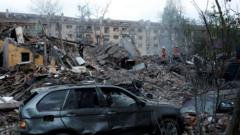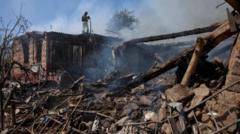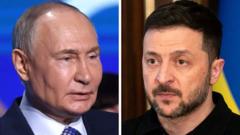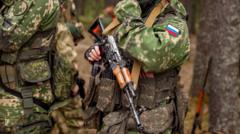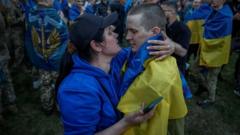New diplomatic developments emerged concerning the search for a cease-fire in the ongoing Russia-Ukraine conflict. The planned high-level talks in London saw a downgrade after U.S. Secretary of State Marco Rubio withdrew unexpectedly, leading to a flurry of concerns about future negotiations. Such changes questions the immediate effectiveness of ongoing peace efforts as tensions continue to escalate.
Diplomatic Talks on Ukraine's Cease-Fire Face Setbacks after Rubio Withdraws

Diplomatic Talks on Ukraine's Cease-Fire Face Setbacks after Rubio Withdraws
High-level discussions in London on the Ukraine war have been reduced, casting doubt on cease-fire progress amid key withdrawals.
Britain's aspirations for a significant meeting to address the Ukraine war have taken a hit following the withdrawal of Secretary of State Marco Rubio. European officials reported that the planned diplomatic session, slated to occur on Wednesday, has now been considerably downscaled. Rubio's decision sparked a ripple effect, prompting British Foreign Secretary David Lammy to also forgo attendance, although he will still engage in discussions with Ukraine’s Foreign Minister in a separate meeting.
While lower-level diplomats representing the UK, France, Germany, Ukraine, and the U.S. are still scheduled to convene for technical talks, the reduction in the meeting's stature raises concerns regarding the trajectory of cease-fire negotiations. During the upcoming meetings, diplomats are expected to outline a proposed peace plan presented by the Trump administration, which controversially includes stipulations for Ukraine to acknowledge Crimea's annexation by Russia and an assurance against NATO membership. This stipulation was immediately rejected by President Volodymyr Zelensky of Ukraine, noting that acquiescing to such demands contradicts Ukraine's constitution.
The decision to diminish the meeting's level emerged from a conversation between Rubio and Lammy, wherein both conferred that additional technical discussions were essential prior to a new gathering of foreign ministers. After a previous meeting in Paris, Rubio cautioned that without significant advancement in negotiations, President Trump would likely divert his attention to other matters of priority.
Initially citing logistical concerns, Rubio later affirmed that the U.S. delegation would be represented by Keith Kellogg, a retired lieutenant general serving as Trump's special envoy to Ukraine and Russia. On social media, Rubio expressed anticipation for productive technical discussions with counterparts from Ukraine and the UK, while stating he plans to visit London again in the coming months. Responding to the shift, Lammy encouraged ongoing discussions, asserting the critical nature of this moment for Ukraine's future and the overall security of the Euro-Atlantic region. Meanwhile, British Defense Secretary John Healey is set to engage with his Ukrainian counterpart during this pivotal period.
While lower-level diplomats representing the UK, France, Germany, Ukraine, and the U.S. are still scheduled to convene for technical talks, the reduction in the meeting's stature raises concerns regarding the trajectory of cease-fire negotiations. During the upcoming meetings, diplomats are expected to outline a proposed peace plan presented by the Trump administration, which controversially includes stipulations for Ukraine to acknowledge Crimea's annexation by Russia and an assurance against NATO membership. This stipulation was immediately rejected by President Volodymyr Zelensky of Ukraine, noting that acquiescing to such demands contradicts Ukraine's constitution.
The decision to diminish the meeting's level emerged from a conversation between Rubio and Lammy, wherein both conferred that additional technical discussions were essential prior to a new gathering of foreign ministers. After a previous meeting in Paris, Rubio cautioned that without significant advancement in negotiations, President Trump would likely divert his attention to other matters of priority.
Initially citing logistical concerns, Rubio later affirmed that the U.S. delegation would be represented by Keith Kellogg, a retired lieutenant general serving as Trump's special envoy to Ukraine and Russia. On social media, Rubio expressed anticipation for productive technical discussions with counterparts from Ukraine and the UK, while stating he plans to visit London again in the coming months. Responding to the shift, Lammy encouraged ongoing discussions, asserting the critical nature of this moment for Ukraine's future and the overall security of the Euro-Atlantic region. Meanwhile, British Defense Secretary John Healey is set to engage with his Ukrainian counterpart during this pivotal period.



